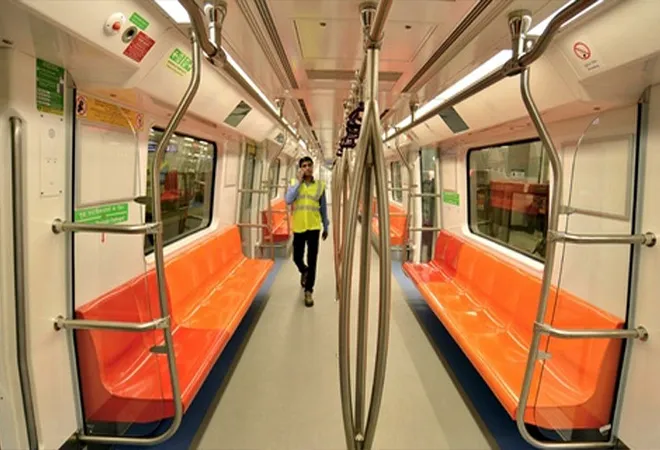-
CENTRES
Progammes & Centres
Location

Following China’s attack on Indian defence personnel at Galwan Valley in Ladakh, there is an overall atmosphere of discontent towards China in India. Several Chinese apps were recently banned as the Indian government deemed that they posed a threat to India’s sovereignty, security and public order. Though a software ban curbs Chinese aspirations of expanding its digital silk road to India, there are demands that Indian firms and government agencies scrap contracts awarded to Chinese firms in all sectors like power and transportation. Several public sector undertakings, including the Indian Railway, have already cancelled mega contracts given to Chinese companies.
Providing indigenous options to China made equipment, heavy engineering and manpower will also have a greater impact in the government’s bid to turn ‘Atmanirbhar (Self Sufficient)’, especially in the transportation, power and infrastructure industries. Within few days of the altercations along the LAC, Chinese firms were shunted out of the bidding process for the Mumbai Monorail project. However, another Chinese firm was awarded a contract worth INR 1,126 crore for the Delhi Meerut Regional Rapid Transit System (RRTS) project. Since the contract award, there have been several outcries to cancel the contract, both from within the ruling party organisations and opposition groups.
However, banning Chinese firms from taking part into a project that they have entered through a competitive bidding process may not be as easy as an app ban. Currently, there are several Chinese companies working on Metro projects all over the country. The Shanghai Tunnel Engineering Company Limited (STEC), which has won the above contract, is also involved in construction of the metro routes and other infrastructure works in the Mumbai Metropolitan Region (MMR). There are five other Chinese firms working on the MMR metro, conducting civil, tunnel works, and system works for the various metro routes. These firms work alongside their consortium partners from all over the world, including firms from India, Japan, France and Germany. As metro projects are funded directly or subsidised by multilateral agencies who do not endorse or allow discrimination against bidders from a particular country, keeping Chinese firms out before the bidding process begins could be the only way out to keep the Chinese away from India’s sensitive public transport networks.
"As metro projects are funded directly or subsidised by multilateral agencies who do not endorse or allow discrimination against bidders from a particular country, keeping Chinese firms out before the bidding process begins could be the only way out to keep the Chinese away from India’s sensitive public transport networks."
While the government was quick to launch the Atmanirbhar Bharat app challenge to indigenise India’s digital experience, such steps have long been in the works for its metro and rail transportation sector. Back when the Metro railway systems were being developed and planned for cities with two million plus population in 2013, the Union Ministry of Urban Development (MoUD) of the erstwhile UPA government set up a committee for ‘standardisation and indigenisation’ of metro railway coaches. Earlier, only rolling stock (coaches) and signalling and communication systems were under the ambit of the standardisation framework. The move to standardise metro rail equipment and components was necessary to bring down costs and bring in uniformity in manufacturing and maintenance of components across various metro systems. Indigenisation of the metro component industry would help in encouraging skill development, manufacturing and job creation for under the Make in India campaign; which has now received renewed focus under the Atmanirbhar Bharat campaign in light of Covid -19 economic downturn.
The Delhi Metro’s strides in indigenisation have provided amazing results, with 90 percent of DMRC coaches being made in India. When the first train of DMRC was launched, the country imported coaches from Germany and South Korea. Stipulation in contracts where less than 25 percent of the rolling stock can be manufactured outside of the country has led to foreign infrastructure companies like Bombardier (Germany) and Alstom (France) to set up manufacturing units in India. Due to standardisation, these coaches can be used as rolling stock in metros across the country. Now, these made in India coaches are also exported to the metro systems of Sydney and Queensland in Australia. The government owned Bharat Earth Movers Limited (BEML) which earned a INR 3,015 crore contract to manufacture rakes for Mumbai Metro, will begin supplying its completely indigenised coaches by the end of 2020, manufactured in its Bengaluru factory. In addition to these, the Indian railways itself through its Integral Coach Factory (ICF Chennai) and Modern Coach Factory (MCF Rae Bareilly) have begun producing metro railway coaches, since there is an expected countrywide demand for 2,000 metro trains between 2015 -2000. The coaches produced by the railways are significantly cheaper by INR 3-4 crore than foreign manufactured coaches. Thus, indigenisation through contract stipulation, knowledge sharing and technology transfers have resulted in creating an industry of metro coach manufacturing that benefits the burgeoning metro railway sector in India.
"Due to standardisation, these coaches can be used as rolling stock in metros across the country. Now, these made in India coaches are also exported to the metro systems of Sydney and Queensland in Australia."
Similar steps can be taken to establish home grown original equipment manufacturers (OEMS) that provide metro components at a cheaper cost and adapted to Indian conditions. The first step to do so is to standardise and establish parameters to adopt these systems for the Indian context. Merely banning Chinese firms from competitive bidding and service provision won’t help in view of the lack of Indian equipment and manpower required to build Indian Metro systems. The government has to take conscious steps to provide impetus to home grown and external entrepreneurs along the lines of domestic arms and ammunition manufacturing to develop the necessary skilling and manufacturing base so that Bharat can have a truly Atmanirbhar metro transit experience.
The views expressed above belong to the author(s). ORF research and analyses now available on Telegram! Click here to access our curated content — blogs, longforms and interviews.

Amruta Ponkshe was Associate Fellow with the Sustainable Development Programme at ORF. Amruta works on mobility and urban infrastructure issues with a special focus on ...
Read More +